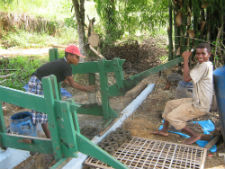Peace Corps Volunteers Introduce Alternative Fuel Source to Communities in Madagascar and Rwanda
Contact
Press OfficePhone
202.692.2230Fax
202.692.1379Email
pressoffice@peacecorps.gov
Madagascar:

 Peace Corps volunteers Robert and Jean Auerbach of Spokane, Wash., are collaborating with their Malagasy community to introduce green charcoal into their local village with hopes of educating neighboring villages about the benefits of the alternative fuel method. Wood charcoal has been the primary fuel source in the Auerbachs Northeastern region for many generations.
Peace Corps volunteers Robert and Jean Auerbach of Spokane, Wash., are collaborating with their Malagasy community to introduce green charcoal into their local village with hopes of educating neighboring villages about the benefits of the alternative fuel method. Wood charcoal has been the primary fuel source in the Auerbachs Northeastern region for many generations. Deforestation is a huge problem in Madagascar, said Robert, who has been working as a business advisor volunteer since February 2011. While easy to transport and store, the production of wood charcoal is a major cause of deforestation and pollution. Almost all of the village residents here use wood charcoal to cook three meals per day. As populations increase, more and more forests are being leveled to an alarming degree.

 Several womens groups and youth organizations in the Auerbachs community are currently undergoing technical training to learn how to produce green charcoal at a local level. Once the trainings are complete, community members will generate income through green charcoal production and sales.
Several womens groups and youth organizations in the Auerbachs community are currently undergoing technical training to learn how to produce green charcoal at a local level. Once the trainings are complete, community members will generate income through green charcoal production and sales.Rwanda:
Peace Corps volunteers Sarah and Jarod Ring of Alma, Ark., worked with their community in Southwestern Rwanda to open a green charcoal briquette factory. Currently there are three trained community members who help produce over 300 green charcoal briquettes each day.

 The great thing about these green charcoal briquettes is that they do not require any destruction of forests or habitats to produce, said Jarod, who has been working as a health volunteer since February 2010.
The great thing about these green charcoal briquettes is that they do not require any destruction of forests or habitats to produce, said Jarod, who has been working as a health volunteer since February 2010. Following a two-day green charcoal training in northern Rwanda, the Rings worked with community members and a local non-governmental organization to purchase a green charcoal briquette press and train community members in green charcoal production.
As word continues to spread about the importance of green charcoal, more community members will be employed at the factory and village resources and materials will continue to be recycled in an environmentally friendly and sustainable way, continued Jarod.
About Peace Corps/Madagascar: More than 950 Peace Corps volunteers have served in Madagascar since the program was established in 1993. Currently, 148 volunteers serve in Madagascar. Volunteers work in the areas of education, environment, agriculture, health and business. Volunteers are trained and work in Malagasy.
About Peace Corps/Rwanda: More than 330 Peace Corps volunteers have served in Rwanda since the program was established in 1975. Currently, 161 volunteers serve in Rwanda. Volunteers work in the areas of health and education. Volunteers are trained and work in Kinyarwanda.
About the Peace Corps: Since President John F. Kennedy established the Peace Corps by executive order on March 1, 1961, more than 200,000 Americans have served in 139 host countries. Today, 9,095 volunteers are working with local communities in 75 host countries. Peace Corps volunteers must be U.S. citizens and at least 18 years of age. Peace Corps service is a 27-month commitment and the agencys mission is to promote world peace and friendship and a better understanding between Americans and people of other countries. Visit www.peacecorps.gov for more information.
Subscribe to the Peace Corps News Mix
Includes news releases, photos, and stories from the field
Peace Corps News Mix
